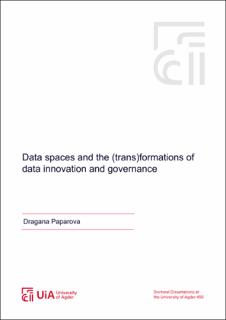| dc.contributor.author | Paparova, Dragana | |
| dc.date.accessioned | 2024-01-17T10:50:51Z | |
| dc.date.available | 2024-01-17T10:50:51Z | |
| dc.date.created | 2024-01-15T15:54:35Z | |
| dc.date.issued | 2024 | |
| dc.identifier.citation | Paparova, D. (2024). Data spaces and the (trans)formations of data innovation and governance. [Doctoral dissertation]. University of Agder. | en_US |
| dc.identifier.isbn | 978-82-8427-172-9 | |
| dc.identifier.issn | 1504-9272 | |
| dc.identifier.uri | https://hdl.handle.net/11250/3112105 | |
| dc.description.abstract | In this thesis, I theorize data innovation and governance as simultaneous processes and account for the distinctive nature of data. Utilizing the concept of space, I show how data innovation and governance in multi-actor environments unfold across certain structures of possible forms, and how the realities data refer to condition the forms innovation and governance can take.
The uniqueness of data entities has been of interest to information systems scholars, imparting distinct value-creation possibilities and dedicated governance approaches. In the literature on digital innovation, data have been referred to as semantic entities whose value can be open-endedly explored once assigned meaning by actors to fulfill various goals and purposes. Across the literature on data governance, data have been referred to as strategic assets that are governed by organizations. This duality of data – as valuable resources that at the same time require proper governance – has also been central in practical debates, such as the European Union’s aspirations for developing data spaces as shared infrastructures for innovating with data, while preserving European values, laws and regulations.
Data innovation commonly requires recombining data that are produced, copied, shared, and used across multiple actors, requiring forms of governance extending beyond the boundaries of single organizations. In this thesis, I build on the process-oriented, realist ontology of assemblage theory to account for data’s distinctive nature and utilize the concept of space to theorize processes of innovation and governance in multi-actor environments. Data spaces, as argued in this thesis, are neither solely geometrical, nor networked; instead, provide forms across which processes of data innovation and governance can change their spatial configurations.
Empirically, I study data spaces through an embedded case study in the highly regulated Norwegian healthcare sector dealing with personal and sensitive health data. The cases take an information infrastructure perspective on studying how health data (including electronic patient record data and patient-generated health data) were innovated with and governed across multiple public and private actors. Overall, the meta-analysis shows how innovation and governance with health data took on different forms as data were processed for various purposes across multiple intertwined data spaces.
This thesis is aimed at theory-building and its contribution is two-fold. First, it shows how the concept of data spaces can be used to study processes of data innovation and governance as unfolding across various organizations, digital technologies, legal basis, and data sources, by changing their spatial configurations as certain thresholds are reached. Second, it shows how data do not simply decouple from the realities they refer to, rather, these realities condition the forms data innovation and governance can take and are shaped by these processes in return. | en_US |
| dc.language.iso | eng | en_US |
| dc.publisher | Universitetet i Agder | en_US |
| dc.relation.ispartofseries | Doctoral dissertations at University of Agder; no. 455 | |
| dc.relation.haspart | Paper I: Paparova, D., Aanestad, M., Vassilakopoulou, P. & Bahus, M. K. (2023). Data governance spaces: The case of a national digital service for personal health data. Information & Organization, 33(1), 100451. doi: 10.1016/j.infoandorg.2023.100451. Submitted version. Full-text is not available in AURA as a separate file. | en_US |
| dc.relation.haspart | Paper II: Paparova, D. (2023). Exploring the ontological status of data: A process-oriented approach. Thirty-first European Conference on Information Systems (ECIS). https://aisel.aisnet.org/ecis2023_rp/299. Submitted version. Full-text is not available in AURA as a separate file. | en_US |
| dc.relation.haspart | Paper III: Svendsrud, D. S. & Paparova, D. (2023). Data hierarchies: The emergence of an industrial data ecosystem. Fourty-fourth International Conference on Information Systems, (ICIS), 14, 2412. https://aisel.aisnet.org/icis2023/diginnoventren/diginnoventren/14. Submitted version. Full-text is not available in AURA as a separate file. | en_US |
| dc.relation.haspart | Paper IV: Paparova, D., Aanestad, M. & Klecun, E. (2023). Beyond organizational boundaries: The role of techno-legal configurations. Fourty-fourth International Conference on Information Systems (ICIS), 24, 2368. https://aisel.aisnet.org/icis2023/ishealthcare/ishealthcare/24. Submitted version. Full-text is not available in AURA as a separate file. | en_US |
| dc.relation.haspart | Paper V: Paparova, D. (2021). Opening-up digital platforms to accommodate patient-generate health data. 8th International Conference on Infrastructures in Healthcare, InfraHEALTH. Submitted version. Full-text is not available in AURA as a separate file. | en_US |
| dc.relation.haspart | Paper VI: Paparova, D. & Aanestad, M. (2020). Governing Innovation in E-Health Platform Ecosystems : Key Concepts and Future Directions. Information Systems Research Seminar (IRIS), 11. Submitted version. Full-text is not available in AURA as a separate file. | en_US |
| dc.rights | Attribution-NonCommercial-NoDerivatives 4.0 Internasjonal | * |
| dc.rights.uri | http://creativecommons.org/licenses/by-nc-nd/4.0/deed.no | * |
| dc.title | Data spaces and the (trans)formations of data innovation and governance | en_US |
| dc.type | Doctoral thesis | en_US |
| dc.description.version | publishedVersion | en_US |
| dc.rights.holder | © 2024 Dragana Paparova | en_US |
| dc.source.pagenumber | 296 | en_US |
| dc.source.issue | 455 | en_US |
| dc.identifier.cristin | 2226947 | |


